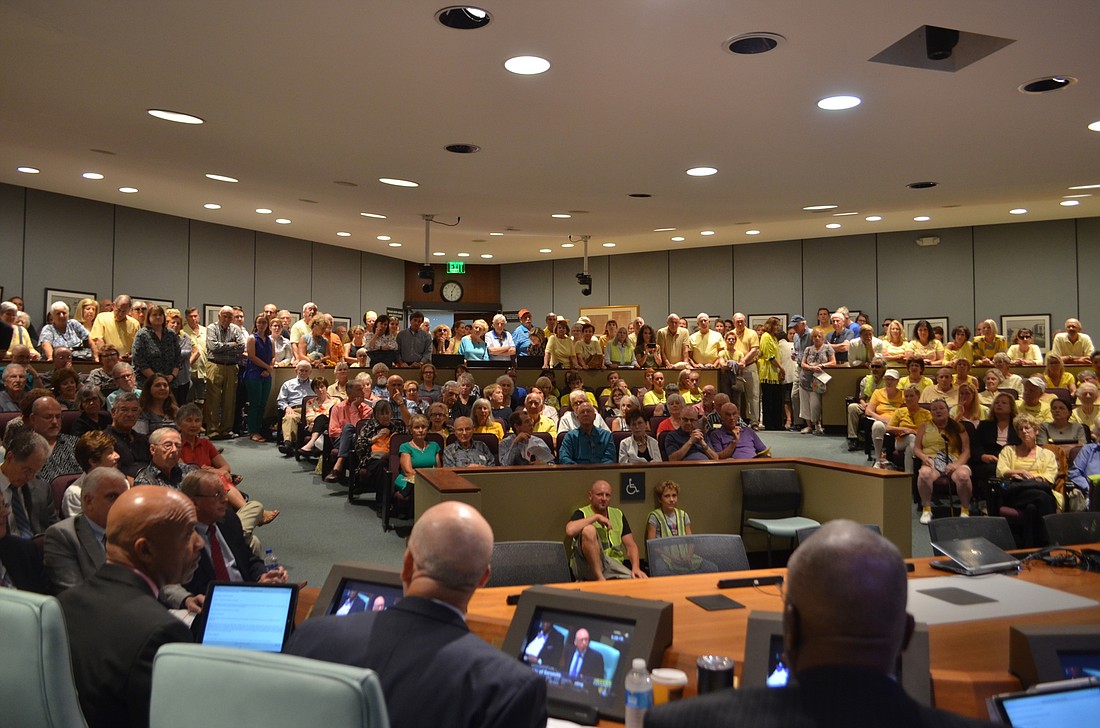- February 5, 2026
-
-
Loading

Loading

The City Commission voted 4-1 to reject the Sarasota Orchestra’s vision for a music center at Payne Park, directing the arts organization to look elsewhere as it plans to build a new venue.
In a meeting that extended into the early hours of Tuesday morning, the majority of the commission expressed discomfort with the prospect of using public parkland for the proposed project. Commissioners said they wanted to find a way for the orchestra to remain in the city long-term and voted to continue the ongoing conversation.
Still, the board made clear it was not convinced Payne Park was the best option available.
“We have a responsibility to hold onto what we were given as stewards,” Commissioner Willie Shaw said.
Joe McKenna, Sarasota Orchestra president and CEO, said after the meeting the orchestra would regroup to reconsider its options for a new facility.
“We will chart the next steps from there,” McKenna said.
The orchestra first shared its desire to build a venue in Payne Park at a February meeting with the City Commission. The orchestra announced plans to move from its current bayfront home last year.
The initial concept called for the concert hall to occupy seven acres in the northwest portion of the 39-acre park, located near downtown Sarasota along U.S. 301. The building would include an 1,800-seat concert hall and 700-seat flexible recital hall.
Both supporters and opponents of the plans turned out for Monday’s meeting, filling the commission chambers beyond capacity.
Critics of the concept raised a long list of objections, calling it a giveaway of public land for a private purpose. They questioned the potential effects on traffic, the level of detail in the orchestra’s proposal and the precedent the request could set for other nonprofits interested in building a new facility.
“Payne Park is a precious, beautiful green space,” said Fiona Dias, a member of the Preserve Payne Park Coalition, which formed in opposition to the orchestra’s proposal. “Please leave it the way it is.”
Advocates for the proposal called the orchestra a valuable part of Sarasota’s cultural community, encouraging the city to grant the organization its favored site. Orchestra representatives vowed to work collaboratively with the public to ensure any project enhanced Payne Park, rather than detracting from it.
“If you all embrace the vision, we’re prepared to be partners with you in all the work that goes forward,” McKenna said.
In a presentation to the commission, McKenna shared some previously undisclosed details regarding the process that led the orchestra to Payne Park. He said the orchestra considered 13 sites in the city — some public, some private — and that Payne Park was the only viable option the group found for addressing all its needs.
Several commissioners were unconvinced by McKenna’s testimony, encouraging the orchestra to be more transparent with the city about its criteria for evaluating potential sites. Vice Mayor Jen Ahearn-Koch said she hoped to see more creative thinking from the orchestra following the initial public opposition to the Payne Park location.
“We haven’t been presented with any other options beside this spot,” Ahearn-Koch said. “That’s all we’re looking at.”
The commission was also uncertain whether the city could use the land for a music hall even if it wanted to. When the city purchased the property in 1925, it came with a deed restriction stating the land should be used “for park, playground and kindred uses and for no other use or purpose.”
City Attorney Robert Fournier said the city could make a legal argument that the venue would qualify as a permitted park use, but it is not clear whether that argument would withstand a lawsuit.
“You don’t really know whether it is or it isn’t (OK) unless you vote to do it and then somebody sues, and then it’s adjudicated,” Fournier said.
The lone supportive commissioner was Mayor Liz Alpert, who said the project could enliven that area of Sarasota while ensuring the orchestra had a long-term home within the city.
“Any community would be dying to get this kind of orchestra investment in this community,” Alpert said. “I think we would be making a grave mistake if we do something to lose that now.”
The commissioners who voted against the proposal said they hoped to see more detailed information from the orchestra at Monday’s meeting. McKenna said the orchestra wanted to see whether the commission was receptive to the broader concept of building a venue at Payne Park before producing more advanced plans.
Ultimately, the commission said it was not prepared to support the vision with the information available.
“I just expected that we would have more of our questions answered today than we did two months ago,” Commissioner Shelli Freeland Eddie said. “I just come away with more questions.”
McKenna said finding a site in the city remains a goal for the orchestra. He did not provide any additional details on the search process moving forward.